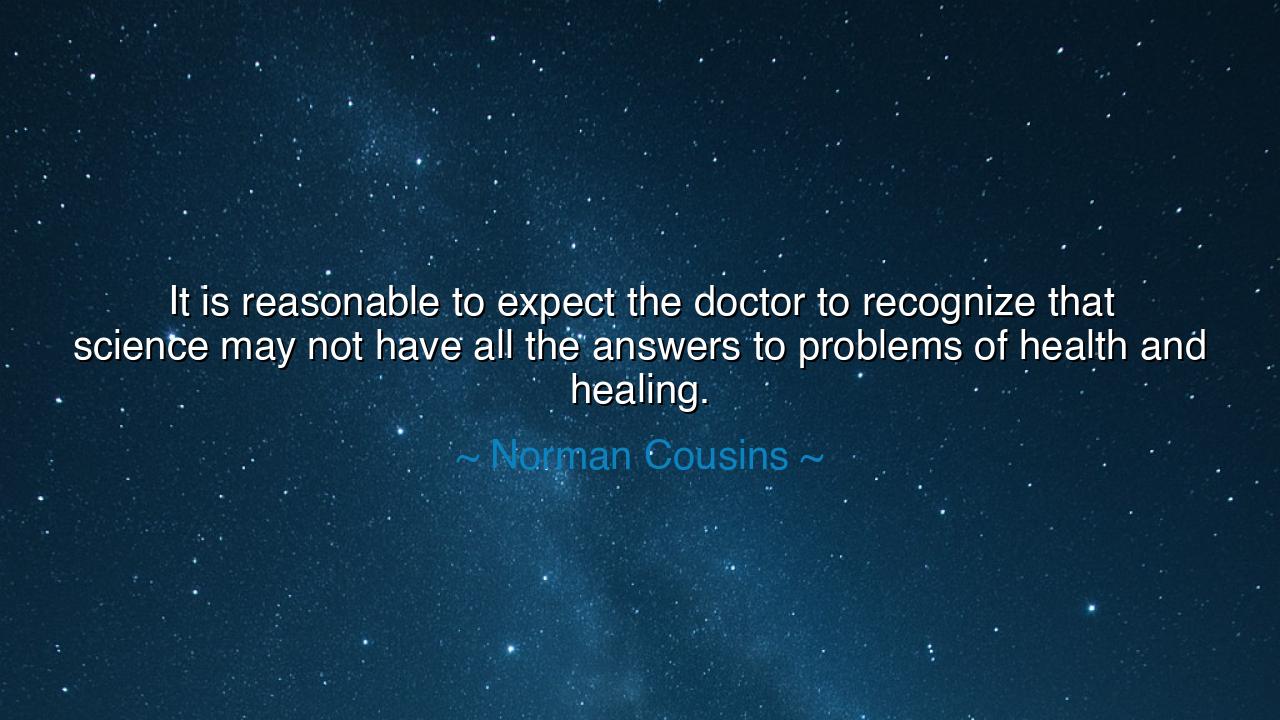
It is reasonable to expect the doctor to recognize that science
It is reasonable to expect the doctor to recognize that science may not have all the answers to problems of health and healing.






The words of Norman Cousins—“It is reasonable to expect the doctor to recognize that science may not have all the answers to problems of health and healing.”—echo with the timeless humility of true wisdom. Cousins reminds us that medicine, though powerful and ever-advancing, is not omnipotent. Even the most learned physician must acknowledge the limits of human knowledge, the mysteries of the body, and the subtleties of the human spirit. Healing, he teaches, is both an art and a science, requiring compassion, observation, and courage as much as technical skill.
In these words lies the recognition that health is multifaceted, encompassing more than what can be measured or explained by laboratory tests or medical instruments. The human body and mind are intricate, intertwined with emotion, environment, and circumstance. Cousins suggests that a wise physician must remain open to possibilities beyond conventional science: intuition, empathy, and holistic understanding are as vital as formulas, medications, or procedures. This approach mirrors the ancient tradition, where healers were philosophers as much as practitioners, attending to body, mind, and soul alike.
The origin of this quote lies in Norman Cousins’ experiences as a writer, editor, and patient. He famously recovered from a life-threatening illness in part through laughter, optimism, and unconventional therapies, documenting his journey in Anatomy of an Illness. From his own trials, he observed that science alone could not account for the profound effects of hope, humor, and mental resilience on healing. Cousins’ reflection reminds both doctors and patients that curiosity, humility, and creativity are essential companions to empirical knowledge in the pursuit of health.
History offers a resonant example in the life of Hippocrates, who is often called the father of medicine. While he codified systematic approaches to diagnosis and treatment, Hippocrates also recognized that the physician must adapt to the individual patient, acknowledge uncertainty, and treat the whole person rather than just the disease. Cousins’ insight is an echo of this ancient wisdom: medicine thrives not only through discovery but through the awareness that the human body and spirit may elude complete understanding.
Cousins’ reflection also carries an ethical dimension. To admit that science may not hold all answers is to embrace humility and honesty in practice. A physician who claims certainty where none exists risks false hope or harm. By contrast, the healer who balances knowledge with acknowledgment of limits fosters trust, collaboration, and the resilience of the patient. In this way, the recognition of uncertainty becomes itself a form of care, guiding patients toward both realistic understanding and empowerment.
Consider a modern parallel in integrative medicine, where physicians combine conventional treatments with complementary therapies, recognizing that nutrition, meditation, exercise, and emotional support can profoundly influence recovery. Patients with chronic illness often find that addressing these broader aspects of life supports healing beyond what pharmaceuticals alone can achieve. Cousins’ wisdom encourages doctors to consider the whole spectrum of influences on health, blending empirical rigor with openness to the unquantifiable dimensions of human well-being.
The lesson embedded in his words is clear: science, while powerful, is not all-encompassing. True healing requires humility, empathy, and attentiveness to the patient as a living, thinking, and feeling being. Physicians, caregivers, and even patients themselves benefit from the understanding that knowledge is partial and evolving. Cousins urges us to cultivate patience, curiosity, and respect for the mysteries of life, even as we apply the marvels of modern medicine.
And so, my children, remember this eternal guidance: trust in science, but honor its limits. Seek knowledge, but cultivate empathy and insight. Approach health and healing not merely as a problem to be solved, but as a relationship to be nurtured—between physician and patient, body and mind, known and unknown. In doing so, you embody the wisdom of Norman Cousins and the ancients alike: that healing is both art and science, certainty and humility, medicine and humanity.






AAdministratorAdministrator
Welcome, honored guests. Please leave a comment, we will respond soon